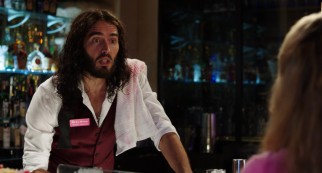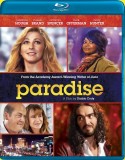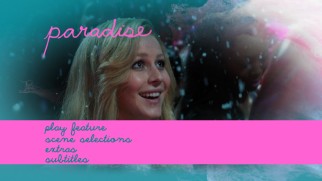Paradise Blu-ray Review
 |
Paradise
Theatrical Release: October 18, 2013 (DirecTV Premiere: August 8, 2013) / Running Time: 87 Minutes / Rating: PG-13 Writer/Director: Diablo Cody Cast: Julianne Hough (Lamb Mannerheim), Russell Brand (William Carr), Octavia Spencer (Loray Bell), Nick Offerman (Doug Mannerheim), Holly Hunter (Melanie Mannerheim), Phil Austin (Pastor Rick), Sarah Colonna (Britney the Clerk), Iliza Shlesinger (Carol), Sam Malone (Emcee), Cesar Lazcano (Zipline Attendant), Kathleen Rose Perkins (Amber) |
Buy Paradise from Amazon.com: Blu-ray • DVD
It's unlikely that anyone else ever makes the transition from stripper/blogger to author and Academy Award-winning screenwriter as quickly and smoothly as Diablo Cody. Cody's unlikely background made her a compelling nominee and unusual victor of the Best Original Screenplay Oscar for Juno. That indie dramedy has seen its widespread initial appeal and acclaim give way to backlash, the pointed and personal kind directed purely at Cody. Cody's latest film, Paradise, is also her first as director. And though it would seem inconceivable just a few years ago, this dramedy premiered on DirecTV over the summer before receiving a theatrical run too limited to track last month. On Tuesday, it swiftly hits DVD and Blu-ray, looking like a direct-to-video movie despite a cast that includes five marketable name actors.
Paradise tells the story of Lamb Mannerheim (Julianne Hough), a good Evangelical Christian girl from the small town of Blakesley, Montana. Raised with religion, home-schooled, and sheltered from pop culture, the 21-year-old Lamb is at the film's start the survivor of a recent plane crash that has left her with severe burns all over her body (just shy of her face). At a speech in church, she surprises the congregation and her own parents (Nick Offerman and Holly Hunter) by announcing she no longer believes in God or religion.
Equipped with a large wad of cash and her own dishes, the aptly-named Lamb heads for Las Vegas to get a taste of all the sin she's been missing out on. There, her dated fashions get her mistaken for an '80s night contestant. Fortunately, two of the first people she meets take a liking to her: English bartender William (Russell Brand) and "bartainer" Loray (Octavia Spencer). Recognizing just how out of her element she is, the jaded Loray takes the wide-eyed blonde gal under her wing for a look at the real Las Vegas, not just the Strip which she points out technically resides in Paradise, Nevada.
William eventually meets up with them and the three enjoy an anything goes late night. Loray gives Lamb a "reverse Ally Sheedy" makeover, cutting her long hair and long skirt. And amidst revelations to one another, Lamb gets to go ziplining and has her introduction to alcohol, which may not be wise to mix with the prescription pain pills she is frequently taking for her skin grafts.
It doesn't take long for you to recognize Cody's voice here. Six years after Juno, she remains a fan of slightly esoteric cultural references (e.g. an AltaVista joke). She also remains a believer in story and characters, things that often fall to the wayside in comedies. Sure, some jokes die, but others are plenty funny. Those who have found Cody's writing obnoxious are unlikely to change their stance based on this.
The film's opening seems like a tacky middle finger extended to Red States and the religious. It's actually quite surprising that Lamb is from Montana and not the Southern states usually targeted by such material. Cody lays it on thick, establishing Lamb's hometown as a stifling, intolerant place that keeps her unexposed to and weary of gays, Jews, Muslims, and such. Kudos to Cody for having ideas and observations relating to life. Most comedies would use small-town country girl visits Las Vegas as the springboard for raunchy outrageousness. Cody uses it to develop a few complex three-dimensional characters and to let them engage in reflection and self-discovery. That, coupled with the unease with which this would play in much of Middle America, better explains the lack of a meaningful theatrical release than the ordinarily safe presumption of inferior quality. Never mind the current 3.7 IMDb user rating; Paradise is not bad, it's just not commercially-minded.
In fact, though Juno grossed an astounding $144 million domestically and $231 M worldwide, Cody's brand of character-driven storytelling seems more suited to the $16 million that Young Adult earned in 1,000 theaters and Jennifer's Body from nearly 3,000. A budget of $5 million gives Paradise some polish and music licensing opportunities, while keeping this an indie film. Indie films are probably Cody's true calling. Her smart, offbeat, divisive personal tales are best suited for limited release, even if they're quite a bit better and more widely appealing than edgier fare the arthouse crowd typically admires.
Cody's body of work is enough to attract talented casts at reasonable prices. Though she's come down some from past budgets (which have ranged from Juno's $7.5 M to Jennifer's Body's $16 M) for this directorial debut, she still gets the in-demand personalities she needs. Hough, who's leapt from "Dancing with the Stars" to a leading lady of not the best or brightest of films (Rock of Ages, Safe Haven), seems like a poor fit for Cody's writing. But you come to see that she is perfect for the role and she acquits herself adequately. Brand, for whom the promise of American movie stardom seems to be fading, does a nice job in his atypical love interest duty. Spencer, whose recent Oscar win doesn't seem to be bombarding her with choice parts, seizes a strong opportunity here as a sage who wonders if she isn't fulfilling the role of "Magical Negro" to Lamb. Hunter and Offerman don't get much screentime, which further speaks to their belief in Cody. Offerman even goes as far to lose his signature facial hair and be unflatteringly bald for his few but important minutes. VIDEO and AUDIO
Paradise might not have cost as much to make as most new comedies, but it looks as sharp as them in this Blu-ray's vibrant, clean 1.85:1 transfer. The 5.1 DTS-HD master audio soundtrack is also up to par, with dialogue remaining crisp and complemented, not overpowered, by music and effects. English SDH and Spanish subtitles, not always supplied for indie films or by distributor Image Entertainment, are a welcome inclusion.
BONUS FEATURES, MENUS, PACKAGING and DESIGN
For an indie film, Paradise gets a decent collection of extras, starting with an audio commentary by writer/director/executive producer Diablo Cody. Hoping she doesn't wind up on The AV Club's Commentary Tracks of the Damned (which, given their D review, she might), Cody speaks engagingly, passionately, and screen-specifically about this film. The video side, all-HD, begins with Paradise's trailer (2:23), which doesn't really do it any favors.
Finally, there are interviews with Cody (4:45), Russell Brand (2:34), Julianne Hough (2:40), and Octavia Spencer (5:01). Cody explains the source of her ideas, while the in-costume actors discuss their characters and their attraction to this project.
The disc opens with menu-inaccessible trailers for Goats, Last Love, and The Numbers Station.
The menu plays clips in a dreamy blue border over the cotton candy titles backdrop with listings placed in a bright pink bar above them. The disc doesn't let you set bookmarks, but it does resume playback just like a DVD.
Other than the full-color disc label adapted from the rear cover art, not a thing jazzes up the plain, side-snapped blue keepcase.
CLOSING THOUGHTS
The Internet seems pretty determined to classify Diablo Cody as an untalented one-hit wonder, but Paradise is now her third screenplay of substance and shows she can direct too. Though she doesn't yet possess the skills of a Jason Reitman (very few do), Cody proves capable of being able to tell her hopeful story in a relatively compelling manner. Paradise's avoidance of standard formula hurts its prospects of finding an audience, but viewers wise enough to give it a chance should find it a witty, rewarding, and unusual Las Vegas trip.
The fairly standard Blu-ray gains points for the inclusion of Cody's enjoyable commentary. While I don't know if this is a movie you'll yearn to revisit, I do encourage you to give it one viewing and see if it's not a lot better than its alternative distribution, lousy reviews, and paltry IMDb rating indicate.
|
Related Reviews:
DVDizzy.com | DVD and Blu-ray Reviews | New and Upcoming DVD & Blu-ray Schedule | Upcoming Cover Art | Search This Site
Written by Diablo Cody: Young Adult • Juno • Jennifer's Body
Julianne Hough: Rock of Ages • Burlesque | Russell Brand: Arthur (2011) • Hop • Bedtime Stories
Octavia Spencer: The Help • Dinner for Schmucks | Holly Hunter: Broadcast News • The Firm • The Incredibles
Nick Offerman: Somebody Up There Likes Me • The Kings of Summer • 21 Jump Street • Casa De Mi Padre
The Hangover • Lay the Favorite • 21 • Butter • Vamps • Everybody's Fine • Stag • Labor Pains
New: The Way, Way Back • Lovelace • As I Lay Dying • Embrace of the Vampire (1995) • Ambushed • Stuck in Love








